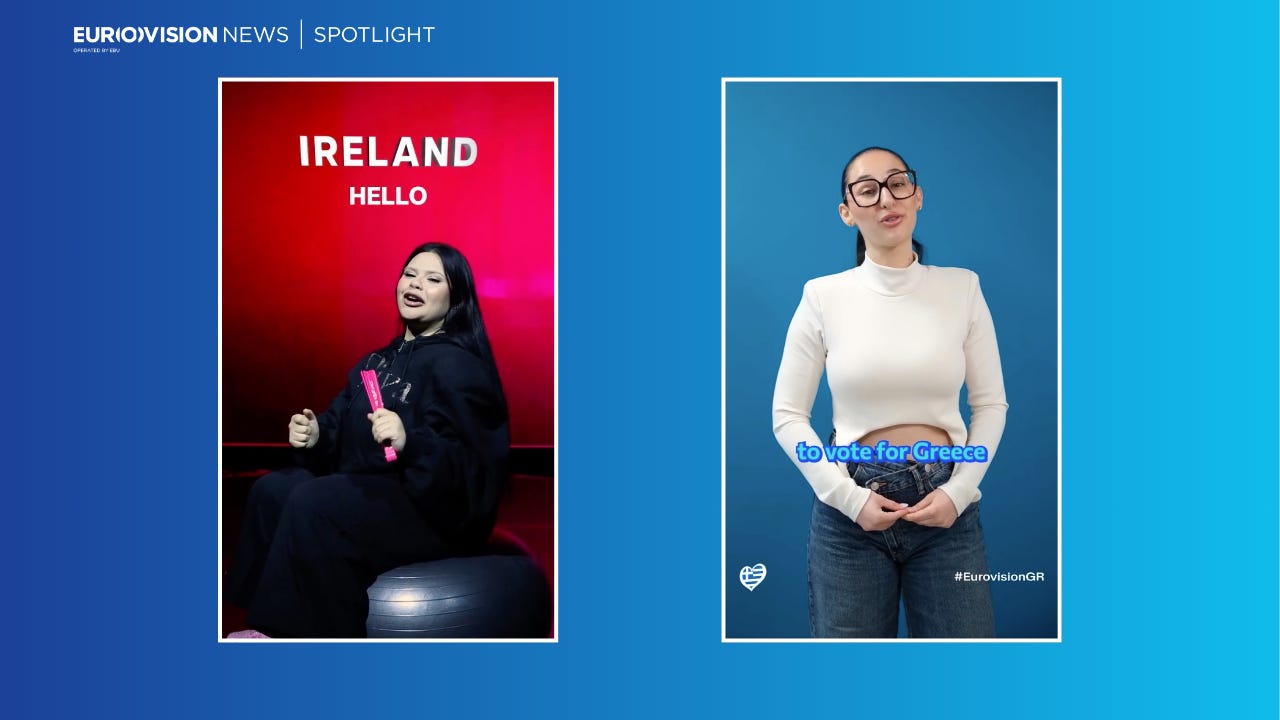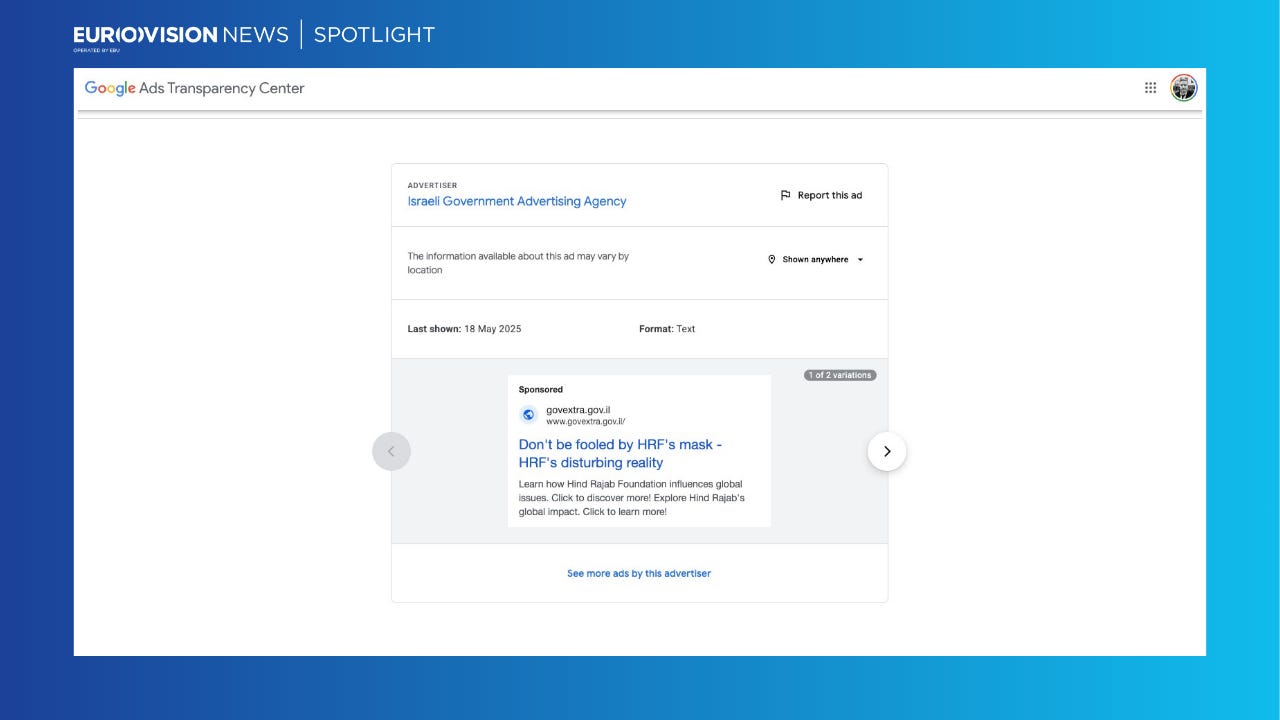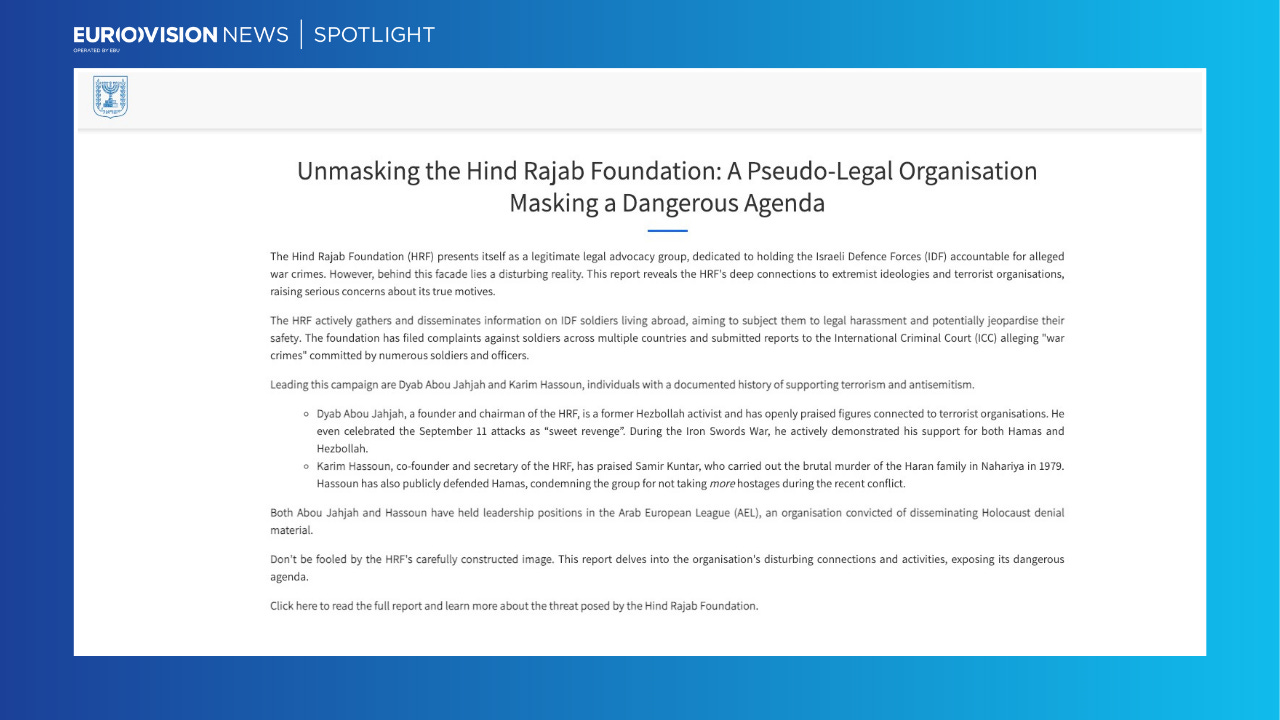Israeli government agency paid for adverts targeting Eurovision Song Contest public vote
All participating countries were targeted with ads on Google products
An investigation by Eurovision News Spotlight has uncovered evidence that an agency of the Israeli government deployed cross-platform advertising and used state social media accounts to directly target and encourage the public in participating countries to vote for the Israeli entry in the Eurovision Song Contest.
The Israeli Government Advertising Agency, which serves various government offices, corporations, government-owned companies, and publicly-owned enterprises, placed advertisements across Google products. They also provided instructions on how to vote up to 20 times for the country’s representative in the 2025 contest held in Basel, Switzerland.
Although promoting a country's entry is permitted, social media users have raised concerns that these actions may contravene the spirit of the competition by potentially politicising or instrumentalising the voting process.
Israel’s entrant, Yuval Raphael, finished in second place, as her performance of “New Day Will Rise” received 297 public votes—the highest number of public votes for any act in Saturday’s Grand Final.
Israel ranked 14th after the jury vote, receiving the maximum 12 points from one country, Azerbaijan, which briefly put the Middle Eastern country in the lead. However, Austria ultimately secured enough public votes to overtake Israel and win the title.
The advertisements placed by the Israeli agency garnered millions of views across the internet leading up to Saturday’s final in Basel.
Analysis carried out by Eurovision News Spotlight of a YouTube account created on April 20, 2025 (Archived here), with the username @Vote4NewDayWillRise, published 89 videos between May 6 and May 16, amassing over 8.3 million views on the platform. (See Update 2)
The account features videos of Yuval Raphael speaking in the languages of other participating nations, encouraging people to vote for her entry.
The account, which is listed as being based in Israel, links only to the official voting portal of the Eurovision Song Contest. The channel is not an official account of the Israeli government.
Analysis of the videos on the channel by Eurovision News Spotlight using open-source tools found no evidence of artificial intelligence, indicating that Raphael was directly involved in the video’s creation.
In total, 35 countries were targeted with long and short vertical videos in their native languages. Each video encouraged viewers to “Vote for ‘New Day Will Rise'” and reminded them they could “Vote up to 20 times”.
On May 6, the account published 16 videos targeting 16 European countries to encourage voters to support “#14”, Israel’s designated number in the contest’s semi-final.
Twelve of the 16 countries targeted in the May 6 campaign, including Armenia (Archived here), Czechia (Archived here), Denmark (Archived here), Finland (Archived here), Georgia (Archived here), Greece (Archived here), Latvia (Archived here), Lithuania (Archived here), Luxembourg (Archived here), Malta (Archived here), Montenegro (Archived here), and Serbia (Archived here), competed in the same semi-final as Israel.
Only voters in countries participating in each semi-final could vote on that evening.
On May 16, the day before the Grand Final, the channel published 73 videos targeting 35 countries (Archived here), urging the public to vote for Israel and reminding them to vote for #04, Israel’s designated number for the final.
For the Grand Final, members of the public in all participating countries are allowed to vote, regardless of whether their country’s entry made it through to the last night.
Although the YouTube channel is not officially acknowledged as having any government ties, analysis of the Google Ads Transparency Center (Archived here) confirms that the advertisements were placed by the verified account of the Israeli Government Advertising Agency.
According to Google, a verified advertiser is confirmed by Google after “submitting acceptable documentation, selecting the country that matches the address in the documentation submitted and submitting a name that matches the name in the documentation submitted”.
Google documentation says organisations in Israel may submit two forms of identification, including organisation registration documents and a government-issued photo ID from an authorised representative.
Amplification
Ahead of both the semifinals and Grand Finals, the official social media accounts of the State of Israel amplified the videos across several platforms, including Instagram (Archived here), TikTok (Archived here), and X (Archived here).
Israeli embassies worldwide were also encouraging people to “vote 20 times” for Raphael ahead of both performances, including the embassies of Israel in the United Kingdom (Archived here), Sweden (Archived here), and Denmark (Archived here).
The Eurovision rules explicitly state that the ESC “is a non-political event”, and all participating broadcasters are responsible for ensuring that measures are taken to avoid the contest becoming politicised or “instrumentalised”.
The extensive promotion of Raphael, however, notably omitted any mention of KAN, the Israeli Public Broadcasting Corporation, the entity the 24-year-old was representing, indicating the broadcaster was not directly involved in the advertising campaign.
Other entrants also advertised
There were also ad campaigns for other entries this year. Social media users in parts of Europe reported seeing sponsored posts for Malta, Greece, Albania, Poland, Armenia and France, although some of these were run by the artists themselves via their own social platforms, and some were promoted via the competing broadcaster in the territory. In some cases, ads were run weeks ahead of the contest, without a prompt to vote.
Maltese singer Miriana Conte ran a series of ads through her own Meta platforms, as can be seen in the Meta Ad Library. An ad campaign for the Greek entry, Klavdia, was run on Meta platforms by Greek broadcaster ERT, via an official Facebook page the broadcaster has for the song contest.
Physical poster advertisements were seen in Italy for Tommy Cash, the Estonian entry, whose song makes multiple references to Italian culture. The poster showed the ads appeared to have been run by Epic Records Italy, a division of Sony Music. The Spotify listing for the song, ‘Espresso Macchiato’, shows it is under exclusive licence to Sony Music Entertainment Italy S.p.A.
The public vote result
Israel received the highest number of public votes in the competition, losing out only because Austria received far more jury votes, making their overall score higher.
Nineteen countries awarded Israel 10 points or higher in the public vote. Israel received the highest number of points from the televote — 12 points — from Australia, Azerbaijan, Belgium, France, Germany, Luxembourg, Netherlands, Portugal, Spain, Sweden, Switzerland and the United Kingdom.
Cyprus, Czechia, Finland, Ireland, Norway and San Marino gave Israel 10 points from the public vote, the second highest score possible from each country.
Views of adverts displayed in these high-scoring countries totalled more than 4.2 million views at the time of writing.
Despite social media speculation about the public vote, there is no evidence of any issues or irregularities with the result.
A history of advertising by the Israeli government
The inclusion of advertising and promoting the country’s Eurovision Song Contest entrant comes as a departure from the agency’s regular activities of communicating the Israeli government's perspective on the Gaza conflict, its defence policies, and its relationships with international bodies.
The agency describes itself as being “responsible for numerous marketing processes that include public and social campaigns for a wide range of topics”.
Analysis of the Google Ad Transparency Center by the Spotlight team found that the Israeli Government Advertising Agency has run more than 5,000 advertisements, some of which target the credibility of organisations that criticise Israel, counter accusations of wrongdoing, and canvass support for Israel's position on issues such as its military operations in Gaza.
One of the ads paid for by the agency links to an Israeli government website govextra.gov.il, a platform provided by the Israeli government to streamline the creation of its online presence — essentially a mini-website builder for departments of the Israeli government.
The advertisement links to a page titled "Unmasking the Hind Rajab Foundation: A Pseudo-Legal Organisation Masking a Dangerous Agenda (Archived here).
The Hind Rajab Foundation (HRF) is the legal arm of the March 30 Movement, a non-profit organisation established in 2024 and based in Brussels, Belgium.
The organisation has filed several requests for arrests and extradition of Israeli soldiers for alleged "war crimes" in countries across the world, and filed a complaint with the International Criminal Court (ICC) against more than 1,000 Israeli soldiers in October of 2024.
The Israeli website says HRF "presents itself as a legitimate legal advocacy group, dedicated to holding the Israeli Defence Forces (IDF) accountable for alleged war crimes," but claims a report by The Israeli Ministry for Diaspora Affairs and Combating Antisemitism "reveals the HRF's deep connections to extremist ideologies and terrorist organisations, raising serious concerns about its true motives."
Another state-sponsored ad (archived here) by the Israeli Government Advertising Agency leads to an Israeli government website (Archived here), under the banner of the Israeli Ministry of Foreign Affairs, which claims to show evidence of bias in "UN (United Nations) agencies regarding Israel, documenting quotes and official statements by UN agencies and officials since outbreak of the war in Gaza in October of 2023.
"Since the Hamas atrocities of October 7th, the longstanding bias and breaches of neutrality by certain professional bodies of the United Nations have been exposed in a blatant and undeniable manner. Key United Nations agencies have spread misleading information and applied double standards when addressing Israel's actions and the broader conflict. They have been misleading both the political and public discourse and serve as a major source of misinformation in international legal proceedings against Israel," the website reads.
Multiple advertisements paid for by the agency linked to an Israeli government website (Archived here) page hosted by govextra.gov.il, which claimed to expose “The Connection Between UNRWA and Hamas in Gaza.
Israel has long accused UNRWA, the United Nations Relief and Works Agency for Palestine Refugees in the Near East, of standing in the way of lasting peace and "perpetuating the refugee issue" in the region.
The Israeli government accused UNRWA employees of being complicit in the 2023 Hamas-led attack on Israel, and in October 2024, Israel’s parliament passed a bill designating UNRWA as a terrorist group and prohibiting it from operating within the country.
Amid an ongoing investigation, 13 employees of UNRWA were fired, nine of whom an oversight committee said may have been involved in the attack on Israel in October of 2023.
The Eurovision Song Contest has been contacted for comment. (See Update 1)
Update 1
In reply to a request for comment from Eurovision Spotlight, Martin Green CBE, Director of the Eurovision Song Contest, said:
“Our voting partner Once has confirmed that a valid vote was recorded in all countries participating in this year’s Grand Final and in the Rest of the World. The voting operation for the Eurovision Song Contest is the most advanced in the world and each country’s result is checked and verified by a huge team of people to exclude any suspicious or irregular voting patterns. An independent compliance monitor reviews both jury and public vote data to ensure we have a valid result.
The Eurovision Song Contest's rules are designed to ensure a fair and neutral competition. These rules do not prohibit participating broadcasters or third parties such as record labels or others from promoting their entries online and elsewhere, as long as such promotion does not instrumentalize the Contest or breach its editorial guidelines. Many delegations employ paid promotion campaigns to support the song, profile, and future careers of their artists.”
Update 2
Further analysis of the YouTube account conducted by the Eurovision News Spotlight team, using the U.S.-based social media analytics website SocialBlade, revealed that the channel lost 28,643,641 views from its total count on May 17. This suggests that the account holder may have deleted video content from the channel.
Additionally, an examination of the account using the Wayback Machine shows a screenshot captured on May 15 that links to an unlisted YouTube video on the channel titled "Vote 'New Day Will Rise' | Yuval Raphael | Eurovision 2025 | Second Semi-Final (15.5)."
According to the YouTube stats, the video, which was published on April 29, 2025, had received over 25.2 million views. Reports from SocialBlade indicate that the video was removed from the channel on the day of the Eurovision Song Contest Grand Final.
It remains unclear whether the video gained additional views on the channel before it was removed or if any further videos were deleted from or marked private on the account.















